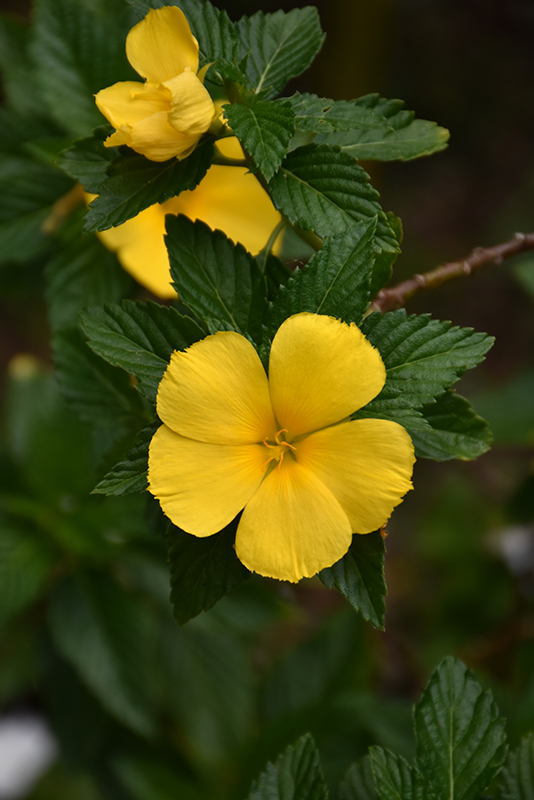Height: 3 feet
Spread: 3 feet
Sunlight:
![]()
Hardiness Zone: (annual)
Other Names: Elm-leaved Turnera, Sage Rose, Yellow Buttercup
Description:
Bright yellow flowers bloom over lovely dark green to gray-green foliage; the flowers last a day, but are borne in profusion all summer, creating a superb show; eventually produces an open airy habit; great for the garden or containers
Ornamental Features
Yellow Alder features showy yellow cup-shaped flowers at the ends of the branches from mid spring to mid fall. Its attractive glossy oval leaves remain dark green in colour with distinctive grayish green veins throughout the year.
Landscape Attributes
Yellow Alder is an open multi-stemmed annual with an upright spreading habit of growth. Its medium texture blends into the garden, but can always be balanced by a couple of finer or coarser plants for an effective composition.
This plant will require occasional maintenance and upkeep, and is best cleaned up in early spring before it resumes active growth for the season. It is a good choice for attracting bees and butterflies to your yard. Gardeners should be aware of the following characteristic(s) that may warrant special consideration;
- Insects
Yellow Alder is recommended for the following landscape applications;
- Mass Planting
- General Garden Use
- Container Planting
Planting & Growing
Yellow Alder will grow to be about 3 feet tall at maturity, with a spread of 3 feet. Although it's not a true annual, this fast-growing plant can be expected to behave as an annual in our climate if left outdoors over the winter, usually needing replacement the following year. As such, gardeners should take into consideration that it will perform differently than it would in its native habitat.
This plant should only be grown in full sunlight. It does best in average to evenly moist conditions, but will not tolerate standing water. It is not particular as to soil pH, but grows best in rich soils. It is somewhat tolerant of urban pollution. This species is not originally from North America. It can be propagated by division.
Yellow Alder is a fine choice for the garden, but it is also a good selection for planting in outdoor pots and containers. With its upright habit of growth, it is best suited for use as a 'thriller' in the 'spiller-thriller-filler' container combination; plant it near the center of the pot, surrounded by smaller plants and those that spill over the edges. It is even sizeable enough that it can be grown alone in a suitable container. Note that when growing plants in outdoor containers and baskets, they may require more frequent waterings than they would in the yard or garden.

